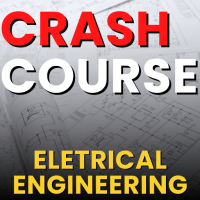Electrical Engineering (EE) Exam > Electrical Engineering (EE) Questions > Inspite of heavy initial investments, dc moto...
Start Learning for Free
Inspite of heavy initial investments, dc motors are used due to
- a)flexibility and ease of control
- b)lower losses
- c)improved power factor of the system
- d)all of the mentioned
Correct answer is option 'A'. Can you explain this answer?
Verified Answer
Inspite of heavy initial investments, dc motors are used due toa)flexi...
The control of dc machines is very much simplified when compared to other machines. So this makes it very useful when compared.
Most Upvoted Answer
Inspite of heavy initial investments, dc motors are used due toa)flexi...
That is due to the large dependency on the control system in daily life and the main curriculum of the latest technology also . the DC motors provide the greatest control action and that are use in robotics in the form of stepper motors that is also known as programmable motor are the best example of controlling while the AC motor shouldn't .while In future if the motors consuming low power with equal amount of torque production in accordance to alternative current motors that replaces the DC motors
Free Test
FREE
| Start Free Test |
Community Answer
Inspite of heavy initial investments, dc motors are used due toa)flexi...
Flexibility and Ease of Control:
DC motors are preferred over other types of motors, such as AC motors, due to their flexibility and ease of control. DC motors can be easily controlled in terms of their speed and torque, making them suitable for various applications. The direction of rotation of a DC motor can also be easily changed by reversing the polarity of the supply voltage. This level of control allows for precise and efficient operation of the motor in different scenarios.
Lower Losses:
DC motors typically have lower losses compared to AC motors. This is because DC motors do not experience as much power loss due to the absence of an AC-to-DC conversion process. In AC motors, the power is first converted from AC to DC before being used to drive the motor. This conversion process results in energy losses due to the inherent inefficiencies of the conversion circuitry. Since DC motors operate directly on DC power, these losses are eliminated or significantly reduced.
Improved Power Factor of the System:
DC motors have a power factor that is close to unity, meaning they draw power from the electrical supply with minimal reactive power. This is in contrast to AC motors, which often have a lower power factor and draw more reactive power. A low power factor can result in increased electricity consumption, higher energy costs, and additional strain on the power distribution system. The improved power factor of DC motors, therefore, makes them more energy-efficient and reduces the overall burden on the electrical system.
Conclusion:
In summary, despite the heavy initial investments required, DC motors are preferred due to their flexibility and ease of control, lower losses compared to AC motors, and improved power factor of the system. These advantages make DC motors suitable for a wide range of applications where precise control, efficiency, and power factor correction are important considerations.
DC motors are preferred over other types of motors, such as AC motors, due to their flexibility and ease of control. DC motors can be easily controlled in terms of their speed and torque, making them suitable for various applications. The direction of rotation of a DC motor can also be easily changed by reversing the polarity of the supply voltage. This level of control allows for precise and efficient operation of the motor in different scenarios.
Lower Losses:
DC motors typically have lower losses compared to AC motors. This is because DC motors do not experience as much power loss due to the absence of an AC-to-DC conversion process. In AC motors, the power is first converted from AC to DC before being used to drive the motor. This conversion process results in energy losses due to the inherent inefficiencies of the conversion circuitry. Since DC motors operate directly on DC power, these losses are eliminated or significantly reduced.
Improved Power Factor of the System:
DC motors have a power factor that is close to unity, meaning they draw power from the electrical supply with minimal reactive power. This is in contrast to AC motors, which often have a lower power factor and draw more reactive power. A low power factor can result in increased electricity consumption, higher energy costs, and additional strain on the power distribution system. The improved power factor of DC motors, therefore, makes them more energy-efficient and reduces the overall burden on the electrical system.
Conclusion:
In summary, despite the heavy initial investments required, DC motors are preferred due to their flexibility and ease of control, lower losses compared to AC motors, and improved power factor of the system. These advantages make DC motors suitable for a wide range of applications where precise control, efficiency, and power factor correction are important considerations.

|
Explore Courses for Electrical Engineering (EE) exam
|

|
Question Description
Inspite of heavy initial investments, dc motors are used due toa)flexibility and ease of controlb)lower lossesc)improved power factor of the systemd)all of the mentionedCorrect answer is option 'A'. Can you explain this answer? for Electrical Engineering (EE) 2025 is part of Electrical Engineering (EE) preparation. The Question and answers have been prepared according to the Electrical Engineering (EE) exam syllabus. Information about Inspite of heavy initial investments, dc motors are used due toa)flexibility and ease of controlb)lower lossesc)improved power factor of the systemd)all of the mentionedCorrect answer is option 'A'. Can you explain this answer? covers all topics & solutions for Electrical Engineering (EE) 2025 Exam. Find important definitions, questions, meanings, examples, exercises and tests below for Inspite of heavy initial investments, dc motors are used due toa)flexibility and ease of controlb)lower lossesc)improved power factor of the systemd)all of the mentionedCorrect answer is option 'A'. Can you explain this answer?.
Inspite of heavy initial investments, dc motors are used due toa)flexibility and ease of controlb)lower lossesc)improved power factor of the systemd)all of the mentionedCorrect answer is option 'A'. Can you explain this answer? for Electrical Engineering (EE) 2025 is part of Electrical Engineering (EE) preparation. The Question and answers have been prepared according to the Electrical Engineering (EE) exam syllabus. Information about Inspite of heavy initial investments, dc motors are used due toa)flexibility and ease of controlb)lower lossesc)improved power factor of the systemd)all of the mentionedCorrect answer is option 'A'. Can you explain this answer? covers all topics & solutions for Electrical Engineering (EE) 2025 Exam. Find important definitions, questions, meanings, examples, exercises and tests below for Inspite of heavy initial investments, dc motors are used due toa)flexibility and ease of controlb)lower lossesc)improved power factor of the systemd)all of the mentionedCorrect answer is option 'A'. Can you explain this answer?.
Solutions for Inspite of heavy initial investments, dc motors are used due toa)flexibility and ease of controlb)lower lossesc)improved power factor of the systemd)all of the mentionedCorrect answer is option 'A'. Can you explain this answer? in English & in Hindi are available as part of our courses for Electrical Engineering (EE).
Download more important topics, notes, lectures and mock test series for Electrical Engineering (EE) Exam by signing up for free.
Here you can find the meaning of Inspite of heavy initial investments, dc motors are used due toa)flexibility and ease of controlb)lower lossesc)improved power factor of the systemd)all of the mentionedCorrect answer is option 'A'. Can you explain this answer? defined & explained in the simplest way possible. Besides giving the explanation of
Inspite of heavy initial investments, dc motors are used due toa)flexibility and ease of controlb)lower lossesc)improved power factor of the systemd)all of the mentionedCorrect answer is option 'A'. Can you explain this answer?, a detailed solution for Inspite of heavy initial investments, dc motors are used due toa)flexibility and ease of controlb)lower lossesc)improved power factor of the systemd)all of the mentionedCorrect answer is option 'A'. Can you explain this answer? has been provided alongside types of Inspite of heavy initial investments, dc motors are used due toa)flexibility and ease of controlb)lower lossesc)improved power factor of the systemd)all of the mentionedCorrect answer is option 'A'. Can you explain this answer? theory, EduRev gives you an
ample number of questions to practice Inspite of heavy initial investments, dc motors are used due toa)flexibility and ease of controlb)lower lossesc)improved power factor of the systemd)all of the mentionedCorrect answer is option 'A'. Can you explain this answer? tests, examples and also practice Electrical Engineering (EE) tests.

|
Explore Courses for Electrical Engineering (EE) exam
|

|
Signup for Free!
Signup to see your scores go up within 7 days! Learn & Practice with 1000+ FREE Notes, Videos & Tests.























